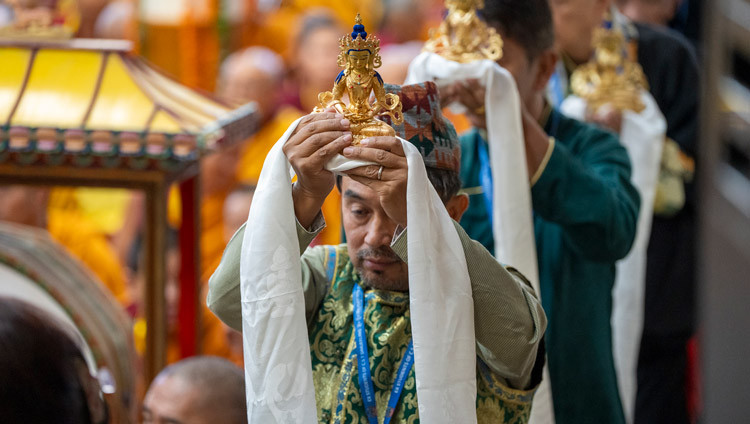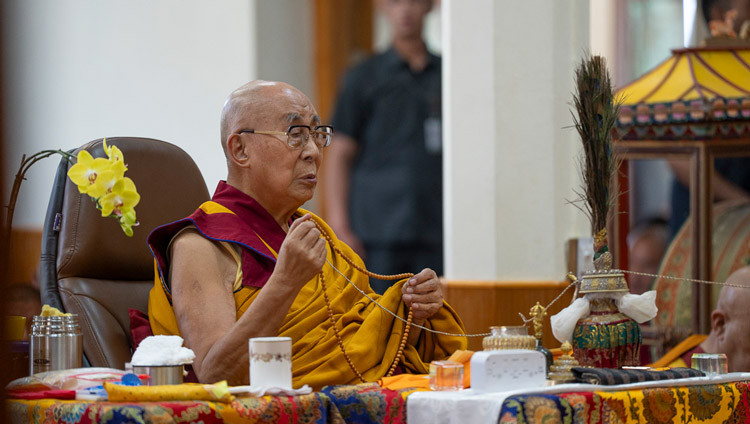Well-being and Resilience
January 22, 2021
Thekchen Chöling, Dharamsala, HP, India – This morning, Mrs Neelkamal Sihota, a mathematics teacher at the British School, New Delhi, welcomed His Holiness the Dalai Lama, on behalf of the school, to an online conversation about Well-being and Resilience. She explained that the students were aged between 11 and 14 years old. She told His Holiness that she and the students were humbled that he had agreed to talk to them and were looking forward to what he had to say.
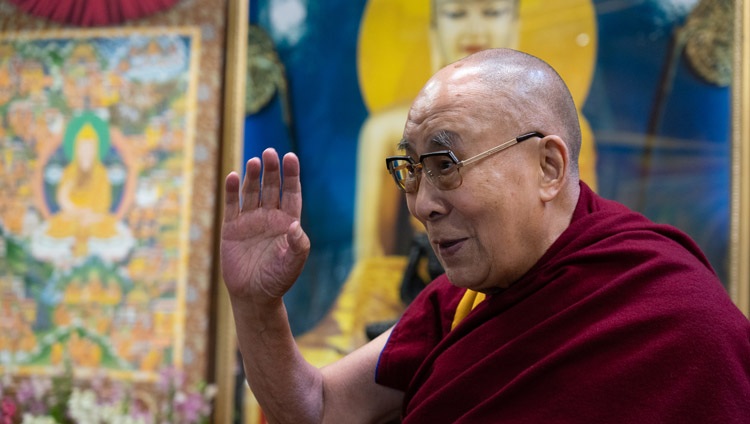
His Holiness folded his hands together and greeted the audience with, “Namaste”. “I am very happy to be meeting with young students who are mainly studying here in India,” he told them. “Since my childhood I have followed an education with its origins in India that was derived from the traditions of Nalanda University. Every part of my brain has been filled with Indian thought. And since I’ve lived here for most of my life, my body has also been nourished by Indian rice, dal and chapatis. Therefore, I consider myself a ‘son of India’.
“During the time I’ve lived here, I’ve been able to meet all kinds of people including modern scientists. I feel I’ve been able to hold my own in discussions with them because of my training in ancient Indian reason and logic. The Buddha encouraged his followers not to take even what he said at face value, but to examine and investigate it. The great scholars of Nalanda like Nagarjuna, Asanga, Dignaga, Dharmakirti and Chandrakirti did just that.
“Scientists have a good understanding of the material world, but their understanding of the way the mind works is not so sharp. We have been able to share with them the Nalanda Tradition’s detailed explanation of the workings of our minds and emotions.
“Meanwhile, India has encouraged the notions of ‘ahimsa’ and ‘karuna’ for thousands of years. Whether a course of action is non-violent or not depends on the motivation that underlies it. If you do something out of anger, it’s likely to be violent. If you are motivated by ‘karuna’ or compassion, your actions will be non-violent. I believe India has the opportunity to combine these qualities of compassion and non-violence with modern education.
“Scientists are keen to learn more about the mind in general, but especially how to achieve peace of mind. In the last century, Mahatma Gandhi set an example to the world of the effectiveness of non-violence to achieve your goals. In this century, those who are young today will have the opportunity to demonstrate how to maintain peace of mind.
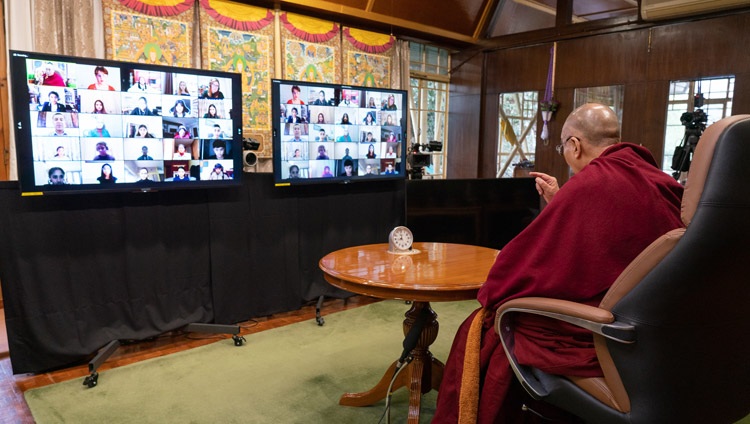
“Many people talk about establishing world peace and although weapons reductions and curtailing the arms trade have a part to play, they will only come into effect if we can first bring about peace within ourselves. We should hold discussions to learn about other people’s points of view and when we face problems, we should settle them through dialogue. Now, do you have any questions?”
Mrs Neelkamal Sihota introduced Misaki Tomiyama, an American student, who was to be the moderator. She introduced the first questioner who wanted to know if our communities will bounce back after the covid disruption. His Holiness told her that this is not the first time the world has faced such serious illness. However, researchers and medical professionals are really working hard to find ways to treat it and help defend people against it. Because of this we should not feel discouraged, but should be confident and positive about the future.
He explained that being physically well also depends on our emotional state. Being at peace with ourselves supports our physical well-being. He quoted an ancient Indian master who gave useful practical advice in relation to this. First analyse the situation that confronts you. If there is a solution to the problem, you should have the courage to put it into effect. If there is no solution, you’re better to accept that that’s how it is. Letting yourself become angry or frustrated won’t help. This is a realistic stance to adopt.
Asked whether he thought peace and stability would return to the world, His Holiness asserted they would. “Many of the problems we face are of our own creation. They come about because we insist on seeing people in terms of ‘us’ and ‘them’. We need instead to recognise the oneness of humanity. Since religion sometimes causes problems, we need to adopt the secular attitude towards it that we find in India. This means showing respect towards all who follow a spiritual path, as well as those who have none. It’s not a question of there being only one truth and one religion — there are many religions as well as many aspects of the truth.
“We face two kinds of problems, some, as I said are our own creation. Others like the extreme weather events, the floods and forest fires, that are part of the climate crisis, are beyond our control. To address climate change, we need to avoid using fossil fuels and to turn to renewable sources of energy that rely on the wind and the power of the sun.
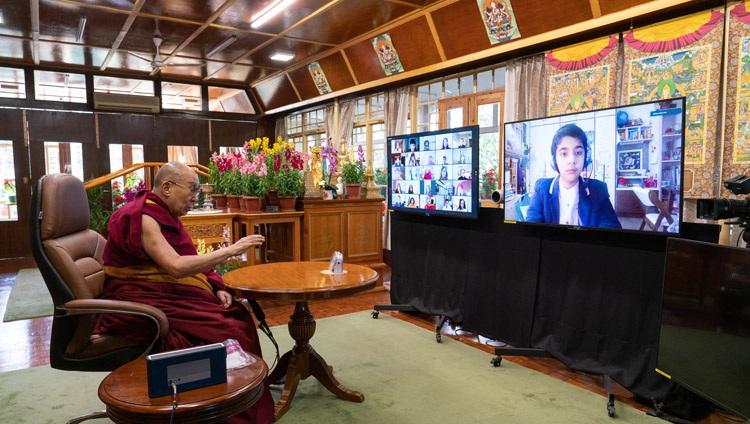
“Some friends have told me that if we do nothing, global warming will result in many of our sources of water drying up. Some have observed that Tibet could become an arid desert like much of Afghanistan. The situation is very serious.”
One young girl wanted to know how to practise compassion when we have to keep a distance from other people. His Holiness told her that we need to think of other human beings as like our brothers and sisters. Human beings are social animals. Showing kindness to each other comes naturally to us from the moment we’re born. In the past, we may have lived in isolated communities, but today, when we are all interdependent, when we live in a global economy, we have to take the whole of humanity into account.
To be resilient we have to maintain our determination and conduct ourselves with compassion and non-violence.
His Holiness was invited to comment on the practice of mindfulness. He observed that to be mindful is to be alert to our physical, verbal and mental behaviour. To be mindful of our speech means that we take care not to use words that will hurt others or that will give rise to suspicion.
We can also be mindful of our physical actions. Jain monks, for example, practise intense mindfulness of how they walk in order not to do other creatures, even tiny insects, any harm. Mindfulness is about being alert to the effect of our actions on others. Consequently, we can even be mindful of how we smile in order not to make our companions uncomfortable.
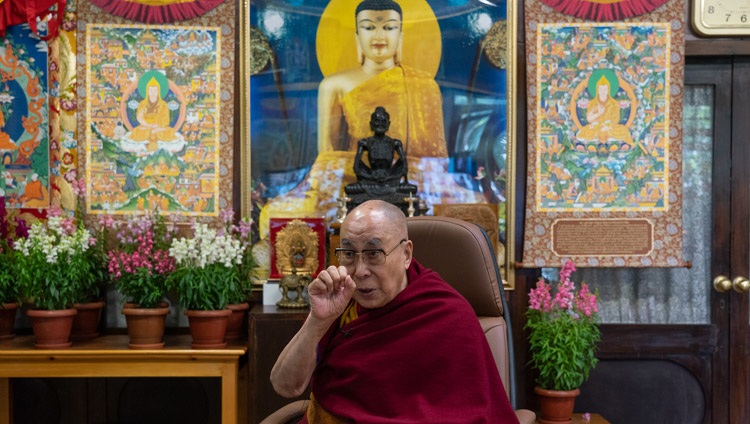
If we become familiar with being mindful in our waking lives, we will even become mindful in our dreams. His Holiness stressed that students should be mindful of their studies, focussing their minds on the subject they’re studying and paying attention to what their teacher is saying.
There are all sorts of actions that we do out of habit which we can change by becoming more mindful. This will enable us, for example, to be more mindful of our relations with our friends and fellow students.
Asked if he had one message about well-being and resilience he would like to convey, His Holiness answered that he constantly tries to promote the idea of the oneness of humanity and seeing our fellow human beings as like brothers and sisters. This is the basis for cultivating concern for the well-being of others and so creating a happier more peaceful world.
He declared that as long as we are able to overcome our problems, we must make an effort to do so without giving up. To do otherwise will just be a cause for regret. “When I escaped from the Norbulingka Palace in Lhasa on 17th March 1959 we didn’t know if we would live to see the sun rise on another day, but we didn’t give up. Because we were determined, we were able to overcome the obstacles before us and escape. We reached India as refugees, where, eventually, we were able to settle down.
“With the support of the Government of India we established schools where our children could study their own language and culture. We re-established our monastic centres of learning where monks and nuns studying rigorously have kept the Nalanda Tradition alive.”
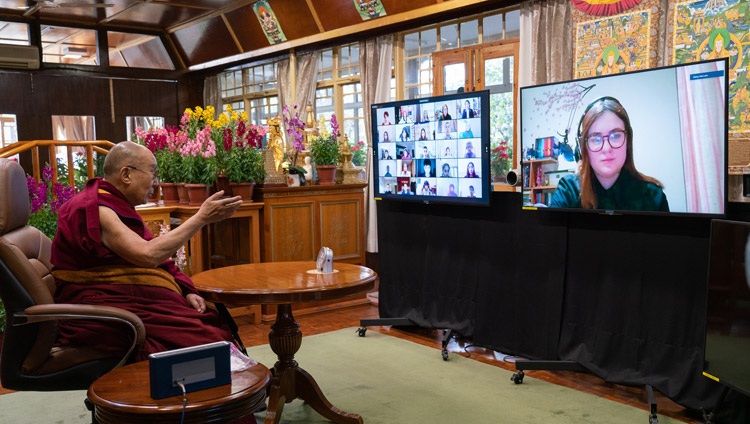
The final question addressed to His Holiness concerned whether he ever gets angry and how he deals with it. He replied that when it comes to such matters as the serious suffering that Chinese hardliners have imposed on Tibetans, he feels sadness rather than anger. He mentioned the ancient Indian master who observed that we can be grateful to our enemies for providing us with opportunities to develop patience. He did reveal, however, that sometimes when the whine of a mosquito disturbs his sleep he may wake up and take drastic action, but usually, as a Buddhist practitioner he thinks of all sentient beings as being kind like his mother and does whatever is necessary to preserve their lives.
Mark Taitt, Secondary School Principal, thanked His Holiness for taking part in this online conversation and his advice on how to find a positive way forward during these difficult times.
His Holiness responded with a few final words of advice. “Education,” he said, “is not just a matter of learning about material things. We also have to learn how to tackle our emotions. In this connection, it’s very useful to think about an observation made in quantum physics that nothing exists as it appears. From this we may conclude that whether we view people or things as good or bad is actually a mental projection. Because of the way people and things appear to us we respond to them with anger or attachment. The idea that some are friends and others are enemies is a partisan view based on our own mental projections.
“Thank you, goodbye, and I hope to see you again.”
SOURCE:https://www.dalailama.com/news/2021/well-being-and-resilience







